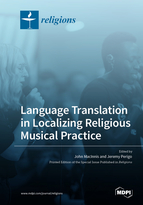Sur-Sangam and Punjabi Zabur (Psalms 24:7–10): Messianic and Missiological Perspectives in the Indian Subcontinent
Round 1
Reviewer 1 Report
This is an excellent study. The topic is fascinating, and the presentation is clear, in-depth, and attends to all relevant matters associated with the topic. I have a few suggestions for improvement, and this concerns removing, rather than adding some material. These are as follows: the two sentences at lines 44-6 are superfluous; the two sentences at lines 55-9 are not entirely correct, and should simply be removed. The single sentence at lines 79-80 (2nd sentence of the paragraph) is an overstatement, and must be removed. Line 123 is not entirely correct (it may be a "bewildering system" to us, but surely not to the authors of it!); remove the sentence. Lines 169-72 are a bit confusing. The narrative has moved from Indian classical music to current Islamic and Bollywood styles. Either build a narrative bridge here, or simply delete the sentence.
Also, please note that the descriptions of Indian classical music in the essay are of the northern variety. Classical music in the south (Carnatic style) is somewhat different, though related to the music of the north.
Lines 428-431. I agree that the Thomas Christian tradition suffered from not engaging with vernacular idioms, but this was a failure not just it in terms of music, it was also language, etc. Additionally, the Thomas Christians DID succeed in S. India, so, despite what happened in the north, this may be an overstatement to link their demise in the north to a failure to engage the local idioms. The fact is, they never got any traction in the north. More important, as the author points out, is that the missionaries of the 19th c. (Protestants), did engage the local idiom, and were successful. I suggest changing the sentence to something on the order of...Although Christianity came to India in the early centuries CE, in the north, it gained little traction until the early 19th century incursion of the Protestant missionaries. Their success may be attributed to their adoption of local idioms in language (translating the Bible into local languages) and employing in presenting Christian literature, prayers and hymns in a form palatable to the local populations, producing, in particular, a psalmody that had the strength to engage local people on the local ground in Pakistan...
Final word here: an excellent study. I commend the author for the interesting topic, the depth of the research, and the fullness of the discussion.
Author Response
Dear Reviewer,
Greetings from Pakistan.
Appreciate your meticulous review and valuable comments/suggestions for the article. Following your suggestions, the edited copy is attached. However, your comments "Line 123 is not entirely correct (it may be a "bewildering system" to us, but surely not to the authors of it!); remove the sentence." I am unable to trace due to the ambiguity of the specific paragraph or line numbers in the article.
Thanks again for your rigorous review.
Salam!
Author Response File: ![]() Author Response.docx
Author Response.docx
Reviewer 2 Report
This article represents a significant contribution to scholarship on comparative music and religion. Can the author insert diacritics in the Indian words, like raga, etc.?
Author Response
Dear Reviewer,
Grace and peace to you from Pakistan.
Thank you very much for your rigorous review and valuable comments.
Following your suggestion, "Can the author insert diacritics in the Indian words, like raga, etc.?" I have inserted the Urdu word Raag in line 83.
Thanks and Blessing!






